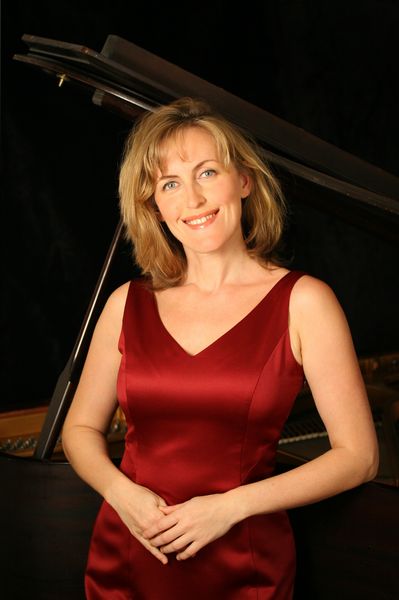Vinokur offers an intimate celebration in American program

In a post-Fourth of July special at Brooklyn’s Bargemusic Friday night, pianist Olga Vinokur gave an engaging recital of short piano pieces by American composers that was short on fireworks but long on intimate personal expression.
Any program, however, that includes Louis Moreau Gottschalk’s patriotic extravaganza L’Union can’t be said to have neglected bombast entirely.
A mini-tradition of 20th-century American music, dating back at least to Virgil Thomson, consists of composers best known for large orchestral or stage works using the solo piano as a medium for musical valentines to friends. Although Thomson was not represented on Friday’s program, Scott Wheeler, Lukas Foss, Leonard Bernstein, and Fred Hersch all were, in charming, often enigmatic musical portraits or tributes.
The program opened in a mellow mood with Wheeler’s Cowley Meditation, left-hand chords sliding along in one tonality, the right hand singing out in another. Wheeler has described the piece, composed in 2009, as a portrait of his fellow Bostonian, organist and composer James Woodman. His 1992 Portrait of Shane Crabtree was more animated amid spurting scales, but still graceful and unabashedly tonal.
Vinokur’s light touch had a certain charm, but made for somewhat pallid renderings of the Wheeler pieces and also of John Adams’s 1978 piece China Gates, which (along with its larger companion Phrygian Gates) the composer called the “opus one” of his distinctive brand of minimalism. The pianist used plenty of pedal to wrap Adams’s repeating figures in a Debussyan haze, but the music’s shifting patterns and twining tendrils still grew satisfyingly.
The second movement of Victoria Bond’s Binary (a 2008 addition to the 2005 original), with its urgent boogie-woogie beat, two-hand trills, and glissandi, called for pianism that was more Jerry Lee Lewis than Debussy, and mostly got it from Vinokur, who appeared undaunted by the frenzy of double notes at the end.
Ever the joker, Lukas Foss put a sultry habanera beat under fragments of one of Bernstein’s most famous tunes in his sly 1988 tribute For Lenny, Variation on “New York, New York.” Vinokur told the joke deadpan, as it should be.
A selection of Bernstein’s own tribute pieces titled Anniversaries, composed at various times between 1942 and 1988, drew from Vinokur the richest, most glowing piano tones of the evening. Each object of the composer’s affections was characterized in a few quick strokes: Stephen Sondheim bluesy and affectionate, Leo Smit in a biting scherzando, Aaron Copland warm and spacious, Elizabeth B. Ehrman staccato and syncopated, Susanna Kyle tender and flowing, Goddard Lieberson neoclassical à la Stravinsky, and the composer’s Chilean wife Felicia bold with a Latin beat.
On Friday’s program, Leo Smit “answered” Bernstein’s tribute to him with an arrangement of four movements from West Side Story, literal transcriptions that artfully used the piano to suggest the original orchestral textures. Vinokur mastered the score’s technical challenges with considerable élan, if not quite the bongo-driven intensity that movements like “Jets,” “Jump,” and “Cool” demand. At the opposite end of the expressive scale, the dainty staccato flutes of “Cha-Cha” could have used a lighter, crisper piano touch.
Jazz pianist Fred Hersch studied the classics, especially Rachmaninoff and Scriabin, with his longtime piano teacher Sophia Rosoff. His 2001 musical tribute to her, Nocturne for the Left Hand Alone, riffs on Scriabin’s famous piece of the same title, and surpasses it for keyboard ingenuity. In Friday’s performance, Vinokur didn’t distinguish melody from accompaniment enough at first, but by the closing pages the “two hands” illusion was complete and quietly amazing, as the pianist somehow produced a flowing tune in sixths over a rolling bass with that single hand.
In 1862, at the height of the Civil War, the New Orleans-born composer-virtuoso Gottschalk penned L’Union–another kind of musical tribute, not to a person but to a cause. Taking a page or two from Tchaikovsky’s 1812, Gottschalk at first depicted a melancholy “Star-Spangled Banner” amid a menacing roar of Lisztian chromatic octaves and rocketing arpeggios, but closed with “Yankee Doodle” and “Hail, Columbia” dancing together in triumphant counterpoint. Vinokur’s uninhibited performance hit all the right notes, on the keyboard and in the music.
After this big finish, her two encores reaffirmed the program’s lyrical character: a glistening fountain of arpeggios surrounded Gershwin’s “Embraceable You” in Earl Wild’s delicious etude; and Scriabin, having lurked behind much of the evening’s repertoire, finally spoke for himself in the rippling C major Prelude, Op. 11, No. 1.
Olga Vinokur performs a two-part program, “Scriabin Inspired by Chopin,” with works of those two composers and commentary by the pianist 6 p.m. Saturday and 4 p.m. Sunday at Bargemusic. bargemusic.org; tickets at brownpapertickets.com/event/4252868.
Posted Jul 10, 2019 at 7:54 pm by Christopher Foss
Brava Olga (if I may use your first name)…..
I wish I could have been there for the Foss, Bernstein, Smitt, etc. concert!
I’d love to talk to you about your choice of works for this program. I should add here that I’m in the process of making a documentary film about Foss and his colleagues’ mission to explore new avenues for classical music.
I hope our paths cross!
All best,
Christopher Foss (son of Lukas)